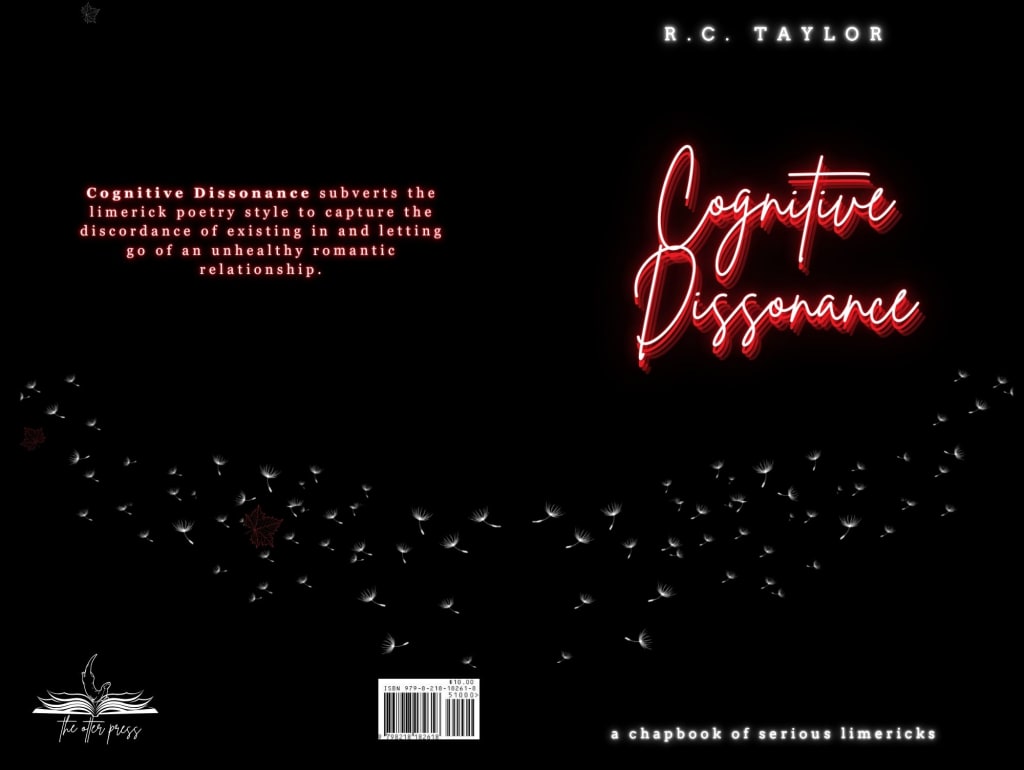About My Chapbook: Cognitive Dissonance
let's get vulnerable

Note: If you would like a content warning please scroll to the bottom of the page.
Recently, I made a chapbook titled Cognitive Dissonance available to the world on a whim. It's only been a handful of days since publication, and a lot more people than I expected were suddenly interested in my little book of 20 poems. It was, honestly, unexpected—very unexpected.
The response has been overwhelmingly positive so far. When provided with a copy, one of our lovely Vocalites, Donna Renee, wrote a beautifully sweet review that, honestly, made me more than teary-eyed after reading it.
It even got Top Story, shoutout to Donna and her always engaging writing style!
With the warm reception, I began to think more deeply about Cognitive Dissonance and my own cognitive dissonance about writing and sharing Cognitive Dissonance (if that makes any sense?).
I believe in authenticity and vulnerability to the point of uncomfortability because I genuinely believe that when we're vulnerable with people and honest about our experiences, that's when we all connect and learn the most. Silence helps keep the greatest illusion of life, the illusion of distance, alive.
And, maybe, that's part of the reason why I invited strangers to read an intimate baring of my wounds and the war between their festering and healing.
Originally meant for just me, I made the decision to publish the chapbook after a fever haze of writing incessantly as I tried to process the disastrous situation I had found myself in. This chapbook was born from the wreckage of myself, when my mental health was at its shakiest.
Funnily enough (or not so funnily), it all began initially with a challenge on Vocal. The Ludicrous Limerick challenge.
Following the humorous prompt of limericks was rather difficult for me, and I only produced a few that were passably funny.
In the end, I couldn't help but to lean more into the "ludicrous" side, focusing on "absurdities of life" even if the only humor in it was morbid and only one I could see. And, for me, what was the most ridiculous in my life was the relationship I had recently exited and began to recognize for what it was: abusive.
It was absurd. Because, even in the midst of it, it all felt like it was happening to someone else. I couldn't understand how I had allowed any of it to happen to me, why I kept making excuses after excuses to see the best in someone who was committed to only seeing the worst in me.
So, I subverted the limerick prompt, making mine serious and sometimes surrealist to capture the complexities of my own incredulous processing of what happened to me. Some I posted, a lot I didn't.
I wrote poem after poem and shared my heart out in therapy, trying to find the root of where I had allowed this to happen—
—was it my PTSD—
—the depression—
—my disabilities—
—or maybe the anxiety—
—definitely the anxious attachment style—
—fear of abandonment?
But, even when trying to heal, I was still shouldering the responsibility for everything, for the way that he treated me.
And then, I let this painful journey of self-examination go because, once again, I was swept back up in his familiar embrace.
I will not go into excruciating details (if you want you can deep dive more with my upcoming publication, ̶U̶n̶Reliable Narrator, which my chapbook is a curated preview of) but I will share the following:
Several times during writing my chapbook, I returned to this relationship. Even after I understood it was abusive, I struggled to reconcile this in my head with the person I fell in love with. I kept thinking if only we could just get back to as I tried to fix, fix, fix. And, I am thoroughly ashamed and embarrassed about it, but in the name of vulnerability I will admit that: after it was published, I even returned one brief, final time before leaving the situation behind for good.
Perhaps the driving force of why I'm writing this journal is that I want to impart:
It did not begin with him screaming at me.
It did not begin with him cheating on me.
It did not begin with him telling me I couldn't trust my friends, my family, my therapist, and myself.
It did not begin with me attempting to kill myself.
It began, like many love stories do, with a date that had absolutely blown me away and a man who appeared to be everything I had ever wanted in a partner. And he seemingly consistently showed up, even in tough moments, to be that man. It was this man whom I fell in love with.
It took months for that persona to unravel and, when it did, it took me with it.
Now, not to toot my own horn, but I am a highly educated woman. A first generation student, I have my B.A. in Psychology, Sociology, and Criminal Studies and an M.A. in Psychology. I'm currently a doctoral student with a focus in Cognitive Neuroscience.
I Knew what domestic abuse looked like from both an academic perspective and a personal one. Growing up with a mother who had been a survivor herself and liberated us from a hellish life with my emotionally and physically volatile father, life had taught me. I Knew the warning signs intimately. Pouring over textbooks to arm myself with knowledge, I was resolute that I would never end up in an abusive relationship like my mother—that I was different and more educated, and therefore, would never make the mistakes she did.
How deeply ashamed I am that I ever thought that. How much I did not understand my mother, understand anyone who had ever been in that situation.
Because the thing is...
To trust is never a mistake. To love and to forgive is never a mistake. It is those who take advantage of that who are truly making the mistakes. It was never her fault, just like it wasn't mine.
Domestic abuse doesn't always knock at the front door and say, "Hi, I'm Abuse". It creeps up on you quietly after you've invited them in and trusted them with the keys.
It starts so subtly you don't even realize that something is shifting—a comment here, a tone there, a testing of the waters. And by the time it does shift, you know it's wrong but they've convinced you so thoroughly that it's you, it's your fault that they get this angry, that you're why all of these problems are suddenly happening. Any time you try to stand up for yourself in moments of clarity you're convinced so dizzyingly that you're wrong and are so egotistical that you can't even see it.
And then in the aftermath of his screaming and and your crying and panic attacks you're showered with affection and put on a pedestal again, the person you thought they were returning just long enough to make their statements credible: see, it must be you.
It's even harder to recognize it for what it is if it's not violence that we can overtly identify, if it's emotional abuse.
So you forgive bigger and bigger things and they learn how easily you want to forgive, how big your heart is and how much you want to help and mend. They become comfortable that they can be their worst selves and never lose you. And that's when everything starts falling apart.
It can happen to you.
It can happen to you.
It can happen to you.
My denial kept me in place so that even as I was being drowned I thought I was being saved by the very person killing me.
It doesn't matter how smart you are, how supported you are, how well-adjusted or successful you are, it can happen to you.
It should never happen to you, but it can happen to you.
Please, if your intuition tells you something is wrong, listen.
Pay attention to how people treat those they don't respect as often this is more telling of their character than how they treat people they do respect; and respect is such a fickle thing.
Believe people when they show you who they are the first time, doubly the second.
If your loved ones tell you something is off, that they don't like how someone is treating you, take note of it even if you disagree, even if you think that you deserved it.
If you are experiencing intimate partner violence or know someone who may be, there are resources to help you. I've included a few below.
Even if you are not experiencing or believe you are not experiencing domestic violence, please take the time to review the resources as well.
Thank you kindly for reading. Please remember that you matter—then, now, tomorrow, always, forever. You are loved, you are loveable, you are wonderful, and you are trying your best. I love you. I'm very proud of you, and I'm so incredibly thankful that you are here.
ORDER COGNITIVE DISSONANCE:
If you're interested in checking out Cognitive Dissonance you can order a physical copy and/or PDF using the link below:
https://forms.gle/D3hcdQ6jdh67GuvL7
RESOURCES:

CONTENT WARNING:
This article contains discussion of emotional abuse as well as brief mentions of child abuse, infidelity, and a suicide attempt.
About the Creator
R.C. Taylor
Part-time daydreamer. Full-time dork.
Follow along for stories about a little bit of everything (i.e. adventure, nostalgia, and other affairs of the heart, and anything else I want to honor and hold space for).






Comments (2)
😭❤️ Thank you so much for being willing to share such a powerful and vulnerable story… I know that putting this out here has to be uncomfortable…but it will help someone know what to look out for in their own life, and it has the potential to help someone who is currently questioning or wondering about their own situation… and that is so worth it.❤️ The “it can happen to you” part really hit me. Your chapbook alone tells a whole story but knowing this part too just makes it all the more complete. Thank you so much for providing resources at the end and the content note too ❤️
Thank you for your openness and vulnerability. ❤️ I relate to this so much. I’m currently working up the courage to tell my own story, something I’ve wanted to do for so long… and I’m inspired to do it now because of a Vocal challenge. It’s still scary. Which is why I’m fictionalizing it, as if it’s not my story. I think the worst part about these abusive relationships is the shame. Blaming myself for putting up with it, especially when I knew the signs and said it would never happen to me. I think that’s why I put up with it. I kept telling myself it wasn’t happening as a coping mechanism for the humiliation that it was.